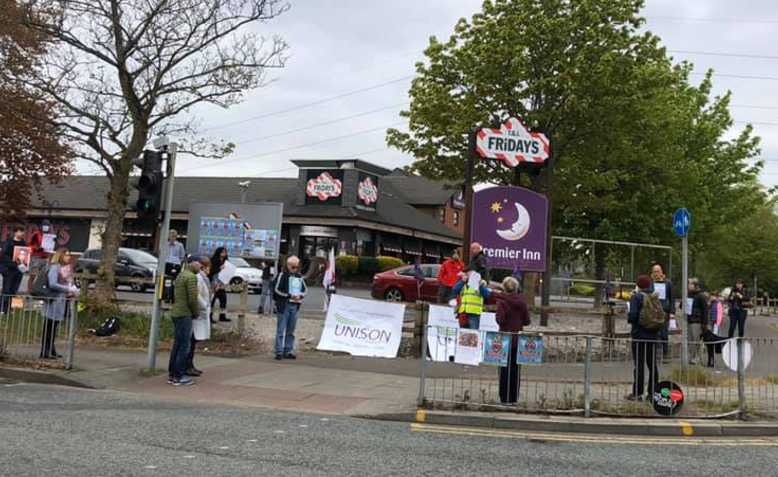 International Workers' Memorial Day in Manchester. Photo: Penny Hicks
International Workers' Memorial Day in Manchester. Photo: Penny Hicks
International Workers’ Memorial Day actions are one more expression of growing workplace anger and popular solidarity with working people, writes Chris Nineham
Across the country and around the world people stopped for a minute’s silence on Tuesday to pay tribute to those who have died as a result of the Coronavirus crisis. The minute’s silence took place on the annual International Workers’ Memorial Day. But given the appalling death toll amongst frontline workers as a result of the virus, this year it had an added charge.
In many parts of Britain health workers assembled outside hospitals to mark the minute’s silence, with lots of them holding placards demanding more protection. Ambulance workers, postal workers and transport workers stopped work in many places. In London, many tubes and buses stopped and tills and shoppers fell silent in a number of supermarkets. There were online rallies organised by Trades Councils and union branches across the country.
The CWU postal workers union reports that many post office collection centres stopped work around the country.
In many places activists were quoting the words of the early twentieth-century US labour organiser and socialist Mother Jones, ‘mourn the dead and fight like hell for the living’.
The fact that unions and campaigners had been energetically pushing the event and the widespread outrage people feel over what has happened to frontline workers forced the media to promote the event and even government ministers to participate.
But Tuesday’s action is one more expression of growing workplace anger and popular solidarity with working people.
As General Secretary of the postal workers union Dave Ward said in a CWU online meeting to mark the moment:
‘There is a new mood in this country, a mood that recognises the contribution made by often underpaid workers in a whole series of key industries. Today we are remembering all those who have passed away, but recognising their sacrifices means that we will have to make changes going forward.’
The minute’s silence came the day after a Panorama programme exposed the systematic failures of the government response and the serial cover-ups that have followed. It showed that the government ignored multiple reports and warnings and the lack of pandemic preparedness, changed health and safety advice because of its own failings and lied about the amount of protection equipment it has supplied.
In terribly upsetting circumstances, Tuesday’s workplace actions mark one more step towards a new movement of opposition to the policies that have caused such damage to our society over the last few decades.
In many places union activists have been pushing back against intransigent and incompetent management. On the tubes in London unions have been imposing safety measures on an extraordinarily irresponsible management. One union activist reported to Counterfire:
‘Since the lockdown was announced on 23 March train drivers and the unions have had to, for all intents and purposes, take over the running of the operational railway to ensure a solidarity service (what management call an emergency service) continued running for our NHS and frontline staff while ensuring our own safety.’
Such a movement will be tremendously popular. An opinion poll published on Monday shows that the vast majority of people are looking for radical social and economic change rather than any return to business as usual. The YouGov poll showed that 72% want the government to introduce job guarantees, 75% want rent controls and 51% want some kind of universal income.
As our business-obsessed elites rush to end the lockdown, building that movement far and wide is a matter of life and death.
Join Revolution! May Day weekender in London
The world is changing fast. From tariffs and trade wars to the continuing genocide in Gaza to Starmer’s austerity 2.0.
Revolution! on Saturday 3 – Sunday 4 May brings together leading activists and authors to discuss the key questions of the moment and chart a strategy for the left.

